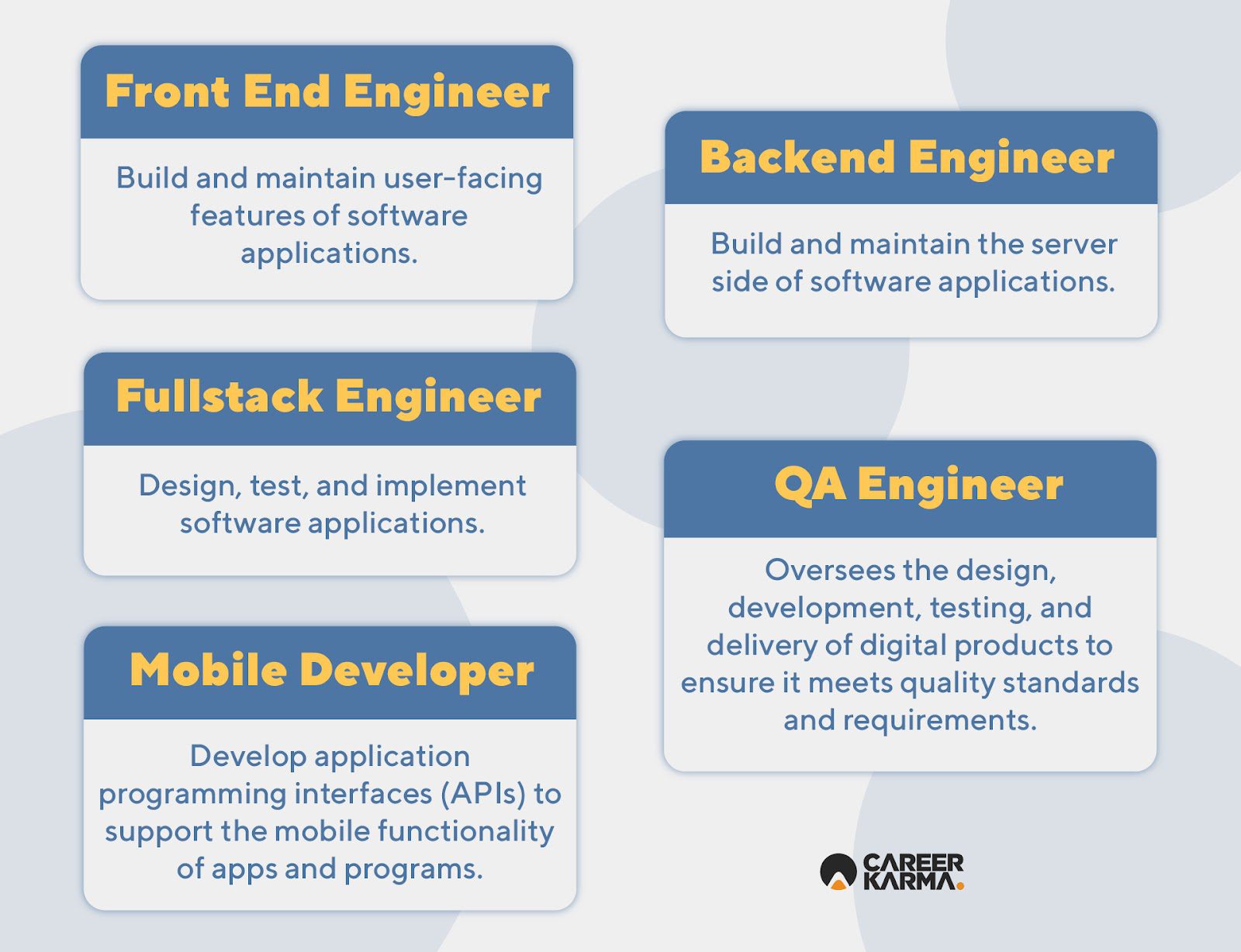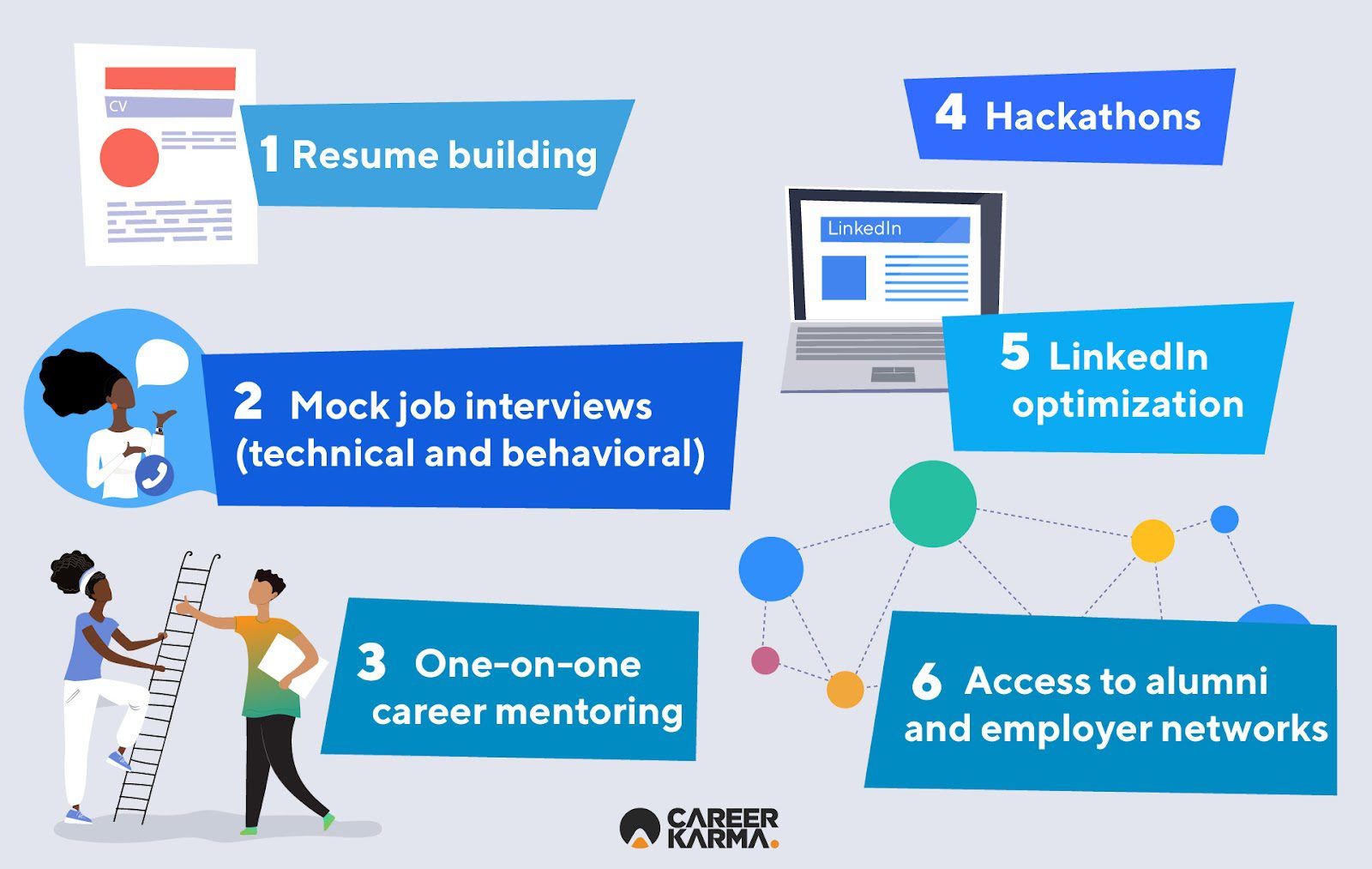It’s a great time to be a software engineer. Let’s look at the facts.
Fact one: companies are scrambling to hire software engineers. As businesses continue to find ways to innovate and automate, the demand for experts who can design, build, and maintain software technologies will only increase. To be exact, the US Bureau of Labor Statistics projects that by 2030, 1.7 million software engineers will be employed not only in the tech sector but also in manufacturing and finance.
Fact two: software engineers pocket higher-than-average salaries. According to PayScale, software engineers in the US earn $80,976 on average as of August 2022. The lowest 10 percent earned $57,000, while the highest 10 percent earned up to $120,000. For comparison, the national average salary stands at $54,132, which means that even software engineers below the median wage still earn more than the average American.
Fact three: software engineers can enjoy excellent career opportunities. No two software engineering careers are the same. The field opens to plenty of career paths you can take, depending on your interests and skills. These roles may vary from technical writer to R&D engineer to application developer and cloud engineer.
Fact four: you don’t need a college degree to become a software engineer. In fact, the number of recruiters who hire developers from non-academic backgrounds has increased. Recruiters rely on technical assessment tests and live interviews to gauge an applicant’s qualifications instead of their college degree.
Put these together, and what do you get? A push in the direction of software engineering. And there’s no better time to pursue a career in software engineering than now. Read on to know how and where to start.
Coding Temple’s Online Software Engineering Bootcamp equips you with the skills you need to launch a new tech career.
Learn more about it here.5 Steps to a Software Engineering Career
1. Decide on the software engineering path you want to take.
A software engineering career is never linear. Because it’s such a big field, plenty of roles have become available for areas that need specific skills. Your first step is to identify which area you’d like to work on.
Do you want to develop user-facing features for software products? Are you interested in creating software for mobile devices? What about building data systems and pipelines that manage raw data?
For a better idea of the software engineering paths you can take, here’s a list of some of the most common engineering roles:

Sam Davitt, a full-stack software engineer and the Alumni Technical Instructor at Coding Temple, shares valuable insights on launching and succeeding in a software engineering career. “Opportunities in tech,” says Davitt, “remain abundant even with the news of recent layoffs. Although the market has been and continues to be competitive, there is always space and available roles for creative, strong individuals.”
Besides deciding which software engineering path you want to follow, you should have the drive, communication, and ability to stand out from the crowd when eyeing a tech job.
2. Learn essential software engineering skills.
Once you’ve locked down your career goal, start identifying the necessary skills to qualify for the job. For instance, you should know which programming language you need to learn. Sure there are many courses online that teach specific programming languages, but if you want to gain more than just one software engineering skill, then coding bootcamps are great options.
Coding Temple offers an Online Software Engineering Bootcamp program available in the following formats:
- Full-Time Immersive Software Engineering Bootcamp (10 weeks)
- Part-Time Evening Software Engineering Bootcamp (12 weeks)
- Self-Paced Flex Software Engineering Bootcamp (access for 6 months)
Whichever format you choose, you’ll be learning from the same curriculum. The program is designed to equip you with the fundamental skills required for various software engineering paths. It includes sharpening your proficiency in:
- HTML/CSS
- Python
- SQL
- Flask
- JavaScript
- React
That said, while companies look for specific technical knowledge, many entry-level roles also prioritize candidates with strong attitudes and abilities toward communication and collaboration. Thus, having the right combination of in-demand soft skills and technical skills helps students land jobs after completing their bootcamp, says Davitt.
“At Coding Temple, we help our students hone these essential skills through small, collaborative classes, constant projects, and lots of individual attention from instructors. From the very first week, Coding Temple students actively participate in our live classes, work together to polish their coding and communication skills, and write lots and lots of code,” Davitt also said.
3. Build, build, build.
While education is important, experience is the new currency in a practical field such as software engineering. At Coding Temple, you get a headstart on acquiring hands-on experience through project-building. Its Software Engineering Bootcamp program comprises seven modules, each challenging you to create projects using specific skills and tools.
For instance, the JavaScript module involves creating a cryptocurrency app. During the SQL module, you will write your own functions to automate SQL processes, and so on. By the end of the program, you will have a portfolio of projects that demonstrate your skills in software engineering.
Coding Temple focuses on having you work on and build projects across the full stack of software engineering. Beginning with object-oriented Python scripts, you will work on various projects utilizing Python, SQL, Flask, JavaScript, React, and more. This culminates in the creation of multiple full-stack web applications.
4. Prepare for the job search.
The truth is that not everyone who has the technical chops gets hired. This is especially true in a competitive job market such as the tech sector. To boost your chances of landing a job, you must have critical job search skills, like networking.
Coding Temple recognizes this, hence the emphasis on career support in its training program. Key services include:

Once you’ve got these skills, start applying for jobs! Remember that software engineering is applicable not only in the IT sector but in other industries such as finance, retail, manufacturing, research and development, and healthcare. So expand your search!
With software engineering, you have more flexibility and freedom to choose where to start your career. You can apply at startups or enterprises depending on your preferred work environment or structure. You can also work with multiple clients as a freelance software engineer.
In that context, Davitt notes how Coding Temple helps students land jobs in tech. “Time, effort, consistency, and tenacity are key to landing a role in software engineering. At Coding Temple, our alumni and career support team work with graduates to help them network, job search, and continue to improve their technical skills. Even when actively interviewing and job searching, it’s important to keep coding. Continuing to learn new skills and creating personal projects that showcase their passion help graduates stand out.”
5. Get hired and keep learning!

According to Coding Temple, 97 percent of their students secured employment in their field of study within six months of graduating, with salaries averaging $81,310. They landed jobs in various roles, such as software engineer, front-end developer, web developer, back-end developer, and full-stack developer in companies that include Amazon, LinkedIn, Deloitte, Dell, and Accenture.
However, learning does not end once you earn your bootcamp certificate. The tech landscape is constantly changing, so you must also keep learning and expanding your skillset to stay competitive. Think about the next steps in your career and be aware of your next professional goals.
Davitt also offers valuable advice to those looking to start their tech careers. “To advance in your career, you have to set clear, attainable goals, meet them, and continue to make more. If you climb a mountain and reach the top, climb another mountain.”
“The field of software engineering is broad. There’s always something new to learn and another skill to gain. Embrace that! Never stop learning and never stop improving your skills.”
Start Your Journey to a Software Engineering Career
Software engineering is an attractive field for those willing to put in the time and effort to gain the necessary skills to attain success in tech. Coding Temple can help you start a software engineering career and give you the foundation to keep climbing the career ladder.
If this is where your passion lies, schedule a call with Coding Temple to jumpstart your career.
About us: Career Karma is a platform designed to help job seekers find, research, and connect with job training programs to advance their careers. Learn about the CK publication.

